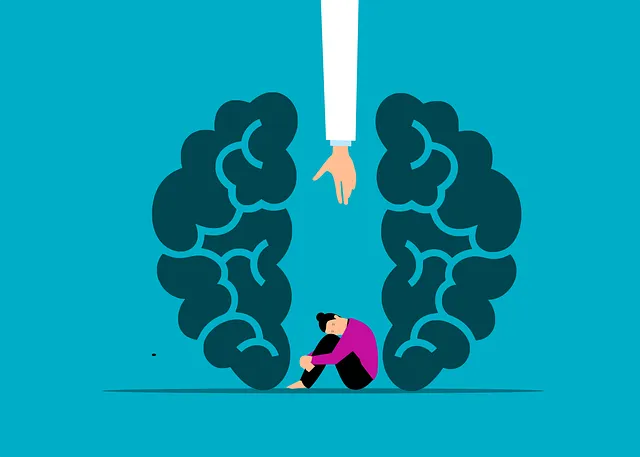Lakewood Kaiser Permanente Mental Health offers comprehensive emotion regulation services, focusing on proactive management of life's challenges. Through identifying triggers, cognitive restructuring, mindfulness practices, self-care routines, and behavioral techniques like shaping positive habits, individuals gain emotional control, improve relationships, and enhance overall well-being. These strategies empower clients to navigate stressors, prevent depression, and lead more fulfilling lives, as demonstrated by the Mental Wellness Podcast Series.
Emotion regulation techniques are essential tools for navigating life’s challenges at Lakewood Kaiser Permanente Mental Health. This comprehensive guide explores various strategies that empower individuals to manage their emotional well-being effectively. From understanding the fundamentals of emotion regulation to identifying triggers, cognitive revisualization, mindfulness practices, and behavioral habits, each section delves into evidence-based methods proven to enhance emotional control. Discover how these techniques can transform your mental health journey at Lakewood Kaiser Permanente.
- Understanding Emotion Regulation: Unraveling the Concepts and Benefits at Lakewood Kaiser Permanente Mental Health
- Identifying Triggers: Tools for Awareness and Self-Reflection in Emotional Management
- Cognitive Strategies: Rewiring Thoughts for Better Emotional Control
- Mindfulness and Meditation: Finding Calm and Presence in the Moment
- Behavioral Techniques: Shaping Positive Habits for Effective Emotion Regulation
Understanding Emotion Regulation: Unraveling the Concepts and Benefits at Lakewood Kaiser Permanente Mental Health

At Lakewood Kaiser Permanente Mental Health, understanding emotion regulation involves comprehending its core concepts and uncovering the profound benefits it offers. Emotional regulation isn’t merely about suppressing feelings but rather learning to manage and respond to them in healthy ways. It’s a crucial skill for navigating life’s challenges, fostering resilience, and enhancing overall well-being.
Through various techniques such as mindfulness practices, cognitive reframing, and stress reduction methods, individuals can gain the tools needed to recognize and control their emotional responses. This proactive approach not only helps in managing existing mental health conditions but also serves as a powerful depression prevention strategy. By mastering emotional regulation, folks at Lakewood Kaiser Permanente Mental Health can cultivate inner peace, improve relationships, and lead more fulfilling lives.
Identifying Triggers: Tools for Awareness and Self-Reflection in Emotional Management

Identifying triggers is a fundamental step in mastering emotion regulation techniques, as it allows individuals to gain awareness and promote self-reflection—key components of emotional management. At Lakewood Kaiser Permanente mental health services, we emphasize the importance of understanding personal prompts that set off emotional responses. These triggers can be external, such as specific environments or interactions with others, or internal, like certain thoughts or memories. By recognizing these triggers, individuals can begin to unravel the complex interplay between their emotions and surroundings.
This process often involves journaling, mindfulness exercises, and self-care routine development, which are integral parts of our Mental Wellness Podcast Series Production. Through consistent reflection, one can identify patterns and gain valuable insights into what provokes emotional reactions. Armed with this knowledge, individuals are better equipped to develop tailored strategies for managing their emotions effectively, fostering improved mental health awareness, and enhancing overall well-being.
Cognitive Strategies: Rewiring Thoughts for Better Emotional Control

At Lakewood Kaiser Permanente mental health, cognitive strategies are a powerful tool in teaching individuals to rewire their thoughts and gain better emotional control. This involves recognizing and challenging negative or distorted thinking patterns that can trigger intense emotions. By understanding cognitive distortions, one can learn to replace these thoughts with more realistic and balanced perspectives.
For instance, techniques like cognitive restructuring encourage people to identify automatic negative thoughts and evaluate their validity. This process promotes resilience building by fostering a more adaptive mindset. Moreover, integrating conflict resolution techniques within this framework helps individuals navigate challenging situations without letting emotions cloud their judgment. Combining these strategies with self-care routine development for better mental health further strengthens the individual’s ability to manage and regulate their emotional responses effectively.
Mindfulness and Meditation: Finding Calm and Presence in the Moment

At Lakewood Kaiser Permanente mental health, mindfulness and meditation stand out as powerful emotion regulation techniques that focus on cultivating present-moment awareness. By encouraging individuals to observe their thoughts and feelings without judgment, these practices foster a deeper connection with the here and now, enabling better emotional understanding and control. Mindfulness meditation, in particular, has gained significant traction through public awareness campaigns development, emphasizing its role in promoting emotional well-being.
Integrating mindfulness into daily routines, such as adopting a self-care routine development for better mental health, can significantly enhance overall mental health. Regular practice allows individuals to develop greater resilience against stressful situations and emotions, thereby improving their ability to navigate life’s challenges. This not only promotes emotional balance but also contributes to a more fulfilling and satisfying life experience, making mindfulness and meditation essential techniques in the arsenal of anyone seeking to optimize their emotional well-being.
Behavioral Techniques: Shaping Positive Habits for Effective Emotion Regulation

At Lakewood Kaiser Permanente mental health services, behavioral techniques play a pivotal role in teaching individuals effective emotion regulation strategies. One powerful method is shaping positive habits. This involves breaking down emotional responses into manageable components and gradually reinforcing desired behaviors. For instance, if someone struggles with anger management, a therapist might guide them to identify early warning signs of anger and subsequently reward themselves for choosing calming techniques like deep breathing or mindfulness exercises. Over time, this reinforces a habit of responding calmly to stressful situations.
By consistently applying these behavioral techniques, individuals can develop inner strength and better manage their emotions in various settings. The process empowers them to take proactive steps during moments of heightened emotion, rather than reacting impulsively. This approach not only helps in stress management but also serves as valuable crisis intervention guidance, enabling individuals to navigate challenging situations with greater resilience.
Emotion regulation techniques, as taught by experts at Lakewood Kaiser Permanente Mental Health, offer a comprehensive approach to managing and understanding our emotional well-being. By exploring various strategies from cognitive reappraisal to mindfulness practices, individuals can gain valuable tools for navigating life’s challenges. Incorporating these techniques into daily routines empowers folks to foster resilience, enhance self-awareness, and ultimately improve their overall mental health, all of which are essential components of a balanced and fulfilling life.






